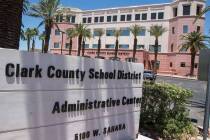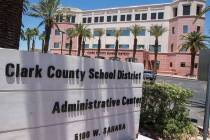Educational Surrogate Parent Program seeks volunteers to advocate for special needs students
Children with disabilities face an uphill battle in school as it is. For those without parents or guardians to look out for their best interests, it's even tougher.
The Educational Surrogate Parent Program provides these children with an advocate whose sole purpose is to ensure that their academic needs are being met.
The program, sponsored by the Legal Aid Center of Southern Nevada, 800 S. Eighth St., helped 110 kids last school year. All child advocates are volunteers, and the center is accepting applications for new surrogate parents. Training is scheduled from 6 to 9 p.m. Sept. 27 at the Child Focus office, 4310 S. Cameron St., Suite 12.
No experience is required, only a desire to help kids, said program coordinator Leslie Murdock.
"You don't need to be an expert," Murdock said. "You just need the attitude that if this was your child, would you be happy with their education?"
The program started in 2007 and serves kids 17 or younger with a wide range of disabilities. Some have behavioral or emotional issues, while others have severe, compounded disabilities.
Bill Kissam is a retired firefighter with a 15-year-old disabled son. He's also a surrogate parent for two 16-year-old boys, one of whom has 18 diagnosed disabilities, including blindness. Names of the children were withheld at the request of the Legal Aid Center.
For Kissam, it's an opportunity to continue his track of community service.
"The opportunity arose to help some really needy individuals," Kissam said. "You've got children who are severely disabled. There's nobody there to even read their report cards. Nobody knows they're out there."
All of these children receive an evaluation for an Individualized Education Program that gives them the best chance of succeeding in school. It's an instruction manual of sorts, that any school can follow to best help the student learn.
For some students in the program, their IEPs were inadequate or outdated, their advocates said, and they might have remained that way if their advocates didn't push for another evaluation.
Patricia LaMonica is a former Clark County School District principal who advocates for four kids with varying levels of disabilities.
"After my time in the school district, I saw there was a great need," LaMonica said. "I think it takes all of us to help improve community needs."
It's not unusual for these kids to move to a new foster home and new school four or five times a year, so consistency is a big part of the program.
LaMonica tries to keep in touch with the kids by phone even though it's not required.
"They don't have that other connection with a parent," she said. "I like to have that connection with them. They recognize there's a significant person in their life."
Her efforts have made an impression on the kids. Every couple of weeks she'll receive a phone call or a text message from them telling her how they did on an assignment or how school is going.
Volunteer Christine Smith advocates for a 14-year-old girl with severe learning disabilities. Smith is new to the program and didn't have any experience with special needs kids before joining the program.
"It's been very enlightening," Smith said. "I had no idea how difficult it is for these kids. It's really frustrating. It just shows how important it is for the kids."
Murdock and the Legal Aid Center help volunteers every step of the way as long as they need it. Volunteers can expect to put in about 25 hours of service per school year, but that number may vary depending on the child's situation.
For more information, visit lacsn.org or call 386-1070.
Contact View education reporter Jeff Mosier at jmosier@viewnews.com or 224-5524.
Educational Surrogate Parent Program
The Educational Surrogate Parent Program, sponsored by the Legal Aid Center of Southern Nevada, plans to offer training for new surrogate parent volunteers from 6 to 9 p.m. Sept. 27 at the Child Focus office, 4310 S. Cameron St., Suite 12. No experience is required to attend.
For more information, visit lacsn.org.com or call 386-1070.

















